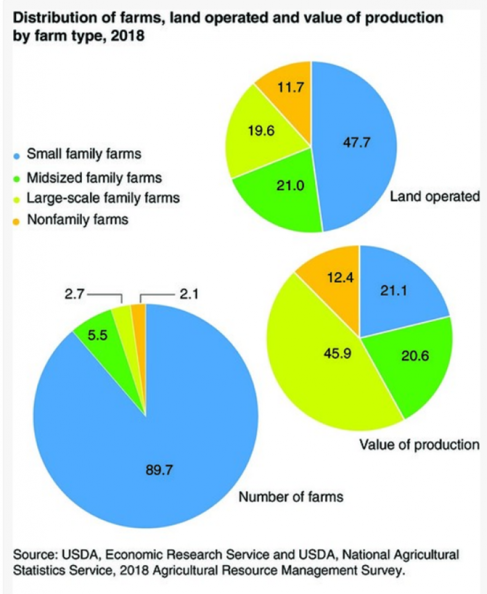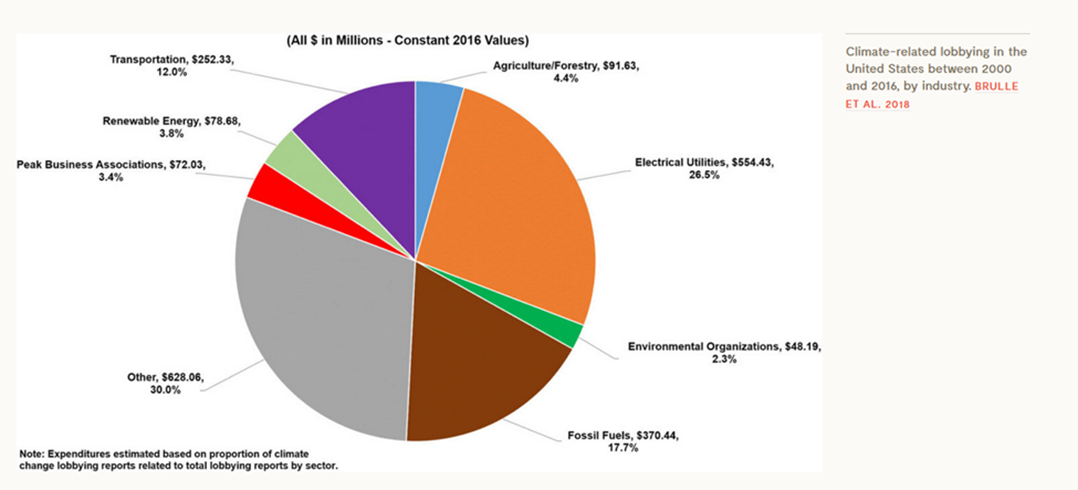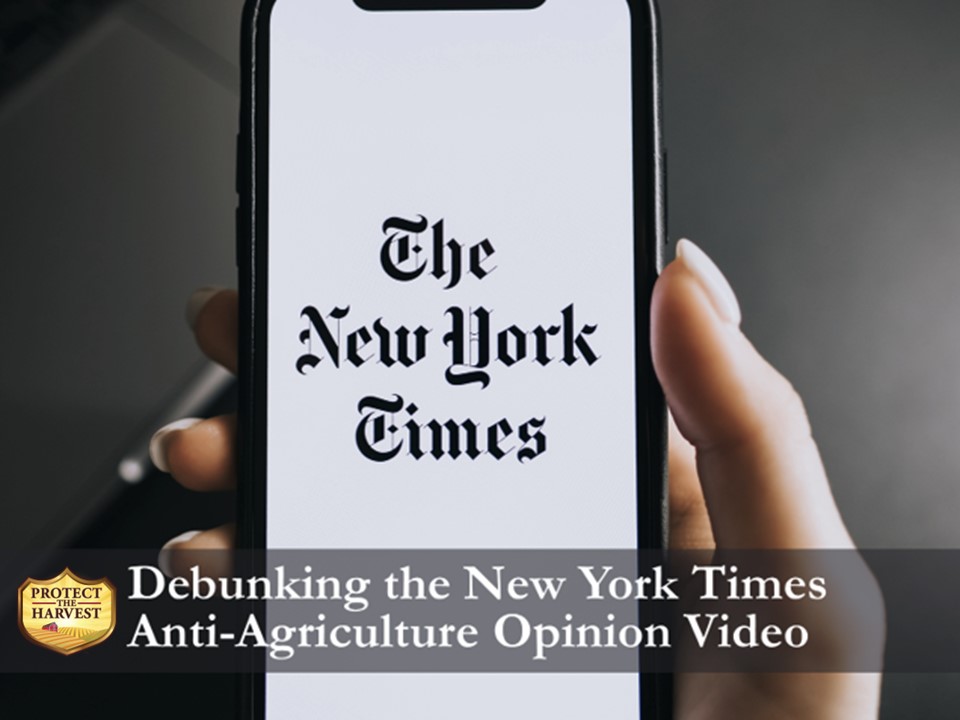An In-Depth Look
The recent opinion video published by the New York Times about agriculture is one of the most distorted and underhanded attacks on agriculture that we have seen to date. A number of effective rebuttals have arisen from the agriculture community, but the misleading agenda-driven nature of the video merits taking a more detailed look.
Consider The Sources—Animal & Environmental Extremism Go Hand in Hand
The video features several speakers with deep ties to animal and environmental extremism, including outspoken vegan New Jersey Senator Cory Booker, environmental attorney Peter Lehner, and New York University environmental studies Professor Jennifer Jacquet.
Booker
Protect The Harvest has written about Booker and his radical ideology numerous times. Booker was appointed to the Senate Committee on Agriculture, Nutrition, and Forestry, which brings to mind the old chestnut about a fox guarding a henhouse. He is the primary driving force behind the recent Farm Systems Reform Act (FSRA), which seeks to eliminate large modern farms by 2040.
Lehner
Lehner has served for years as the chief environmental lawyer for New York City and New York State. He is the executive director of the National Resources Defense Council and is also associated with environmental extremist group Earth Justice. The NRDC is a known environmental extremist group with board members also involved in animal extremist activities.
Jaquet
In addition to the current attack on American agriculture, Jacquet has been active in a variety of anti-animal use campaigns. Jaquet’s projects include working to ban private zoological parks and fighting the commercial fishing industry because of the “sentience of fish.”
American Agriculture Maligned
Considering the underlying ideologies of the video’s speakers, the drastically skewed depiction of agriculture is not surprising. The main target is what the speakers refer to as “big ag.” The video takes particular aim at the beef and dairy industries, but it certainly doesn’t fail to harshly criticize the entirety of American agriculture. This criticism is somewhat surprising considering that vegans need their foods of choice to be grown somewhere too.
Interestingly and quite tellingly, in lieu of solutions, the video instead calls for increased regulations and demonizes the agriculture industry for profiting. This strongly suggests that the environmental and animal well-being championed by the video’s speakers are merely a guise for something much more sinister.
Terms Used by Extremist Groups to Manipulate Public Opinion
The terms “industrialized ag,” “corporate ag,” “big ag,” and “factory farms” are used throughout the video. These propagandic labels have been staples in the extremist movements’ lexicon for quite some time and are intentionally used to dehumanize and degrade the agriculture industry. This video goes even further, overtly stating that the familiar representations of multigenerational farm families working to sustainably operate are false.
It’s important to remember that incorporation is just a business structure that is utilized by many types and sizes of agricultural operations.
Disinformation
Further emphasizing the extreme disconnect between the anti-agriculture movement and reality, the video repeatedly shows images of meat packing plants, finishing yards and farrowing sheds calling them “factory farms” and portraying them as encompassing the entirety of meat production. In reality these modern facilities are single, distinct phases in the production cycles of cattle and swine. The processes in which have been developed and implemented by university researchers and veterinarians who specialize in livestock welfare and production.
98% of Farms in America are Family Farms
The video states that our nation’s food comes from a small number of very large farms. This is simply not the case.
USDA research states: “family farms remain a key part of U.S. agriculture, making up 98% of all farms and providing 88% of production. Most farms are small family farms, and they operate almost half of U.S. farm land, while generating 21% of production. Midsize and large-scale family farms account for about 66% of production; and non-family farms represent the remaining 2.1% of farms and 12% of production.”

The “Big Ag” Lobby Is Not the Most Powerful Lobby in D.C.
The NYT video paints the picture that, in terms of dollars spent lobbying, the environmental lobby just can’t compete with the agriculture lobby. The speakers complain that “big ag” holds too much sway over environmental policy. What the video fails to inform the audience is that both the agriculture and environmentalist lobbies are both relatively small players in the overall climate-related lobbying picture. The following graph comes from Yale University’s Robert Brulle, who analyzed lobbying expenditures related to climate change and carbon.

Global Issues Cannot Be Solved by A Single Nation
Near the beginning of the video Senator Booker says, “You cannot solve the climate problem unless you fix the American and global food systems.”
The video states that globally, agriculture is responsible for 1/3 of greenhouse gas (GHG) emissions. However, it very conveniently does not share the amount for which the United States is actually responsible. The following graph comes from the Food and Agriculture Organization of the United Nations (FAO).
It is easy to see that the type of heavy-handed, egregious regulations that Booker, Lehner and Jacquet advocate implementing would have a very limited impact on total global GHG emission rates.

Water Pollution Doesn’t Just Come from Animal Agriculture
Shown repeatedly in the video is a manure lagoon, which is a standard and widely accepted part of waste management practices on modern large-scale operations. These lagoons provide materials for fertilizer, which includes nutrients for crop growth (nitrogen, phosphorus and potassium). Incidentally, stabilization ponds are also used to manage waste from cities and towns across America.
Lehner speaks of “putting poop in our water,” and overall, the video relies heavily on the “ick factor” of animal wastewater pollution. Conveniently though, it almost completely ignores the fact that plant agriculture is also responsible for water pollution from fertilizers, pesticides, and irrigation runoff. This is not to decry any type of agriculture; manure is simply part of food production from animals to crops that must be properly managed. The overall agriculture community has shown repeatedly they are committed to just that, despite what agenda-pushing politicians would have you believe.
Cattle Aren’t Climate Criminals
The video makes the bold claim that if all cattle in the world were a country, they would be the second largest GHG emitter next to China due to the methane they emit during their digestive processes. It’s important to note that the methane from cattle only accounts for about 2% of total GHG emissions in the United States, and the role of methane in the atmosphere is much different than that of CO2 (see information in link below). In addition, a November 2017 study from the National Academy of Sciences found that elimination of ALL farm animals in the United States would only decrease our nation’s greenhouse gases by 2.6 percent.
Elimination of Animal Agriculture Would Be Disastrous
Eliminating animals from the food supply would have broad, disastrous consequences on several levels, most significantly on nutrition of the global population.
Studies have repeatedly shown that the nutritional needs of our country and the world simply cannot be met with strict plant-based diets. Research by Robin R. White and Mary Beth Hall, published by the Proceedings of the National Academy of Sciences, stated: “It is entirely possible to meet the nutrient requirements of individual humans with carefully crafted, unsupplemented plant-based rations, but this can be a challenge to achieve in practice for an entire population.”
Further, they found that plant-based rations were associated with greater deficiencies in calcium, protein, vitamin A, and vitamin D, and were higher in sugar and low in essential micronutrients, and thus did not necessarily result in improved nutritional quality or health outcomes.
Tryon Wickersham is an associate professor of animal nutrition in the Department of Animal Science at Texas A&M University. He writes, “Phasing beef out of our diets could harm people’s health and worsen global inequality, without substantially improving the climate… whatever foods are used to replace beef have their own footprint, so a substitution isn’t likely to make a meaningful change in overall emissions.”
Food For Thought
Something that the NYT video, and the vegan movement in general, blatantly ignore is the fact that animal agriculture is a vital part of the overall food supply cycle. Quite simply, animals produce manure which is vital for fertilizing crops and virtually all of that manure comes from the large modern farms that Booker would like to see eliminated completely. To put it more simply: vegans rely on animal agriculture, even if they don’t like to admit it.
So, what is their real end-game?
Profit is at the core of any good business model. It is very telling that toward the end of the video Booker complains that “big ag” is keeping all of the profits to themselves, strongly suggesting that the true target is actually set on redistribution of wealth and Stalin-esque centralized food production. As Henry Kissinger infamously said, “Control oil and you control nations, control food and you control the people.”
Links
Biased Attacts on Beef Industry Debunked by Facts HERE
2021 USDA Report on Family Farms in America HERE
Booker – Beware Booker’s Illusion of Supporting Farmers and Ranchers HERE
Booker – Fox in the Henhouse HERE
Wildlife Corridors Conservation Act HERE
Farm System Reform Act Articles
Disinformation and COVID Fears Rampant as Farm System Reform Act is Reintroduced HERE
Safe and Affordable Food at Risk if Radical Legislation Becomes Law HERE
Boycott Big Meat Campaign Launches to Support Farm Systems Reform Act HERE



